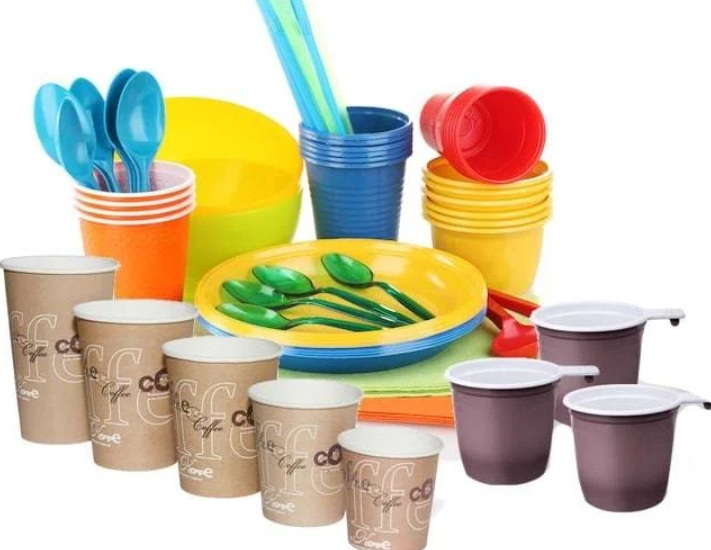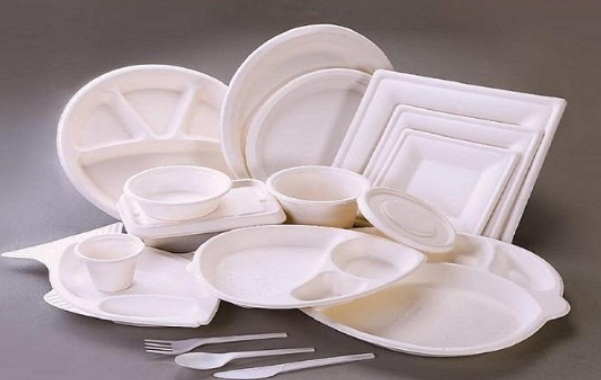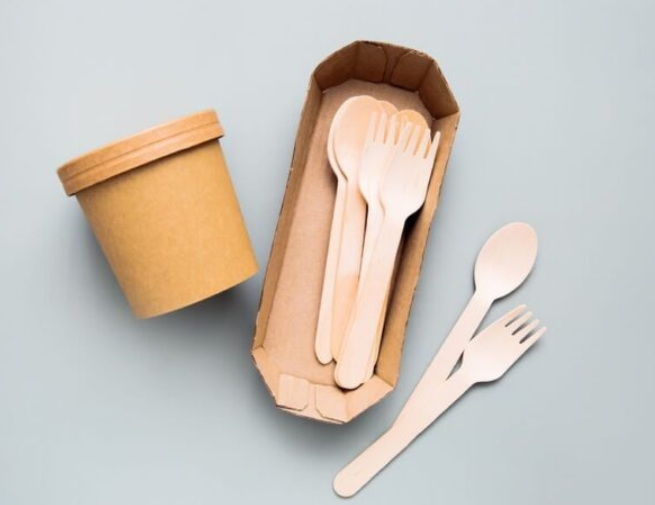
Content Menu
● Introduction to Disposable Tableware
>> Types of Disposable Tableware
● Leading Disposable Tableware Manufacturers
● How to Find Reliable Manufacturers
● Market Trends and Future Outlook
>> Challenges and Opportunities
>> Emerging Materials and Technologies
● Top Biodegradable Tableware Manufacturers
● Strategic Partnerships and Collaborations
● Consumer Awareness and Impact
● Conclusion
● FAQs
>> 1. What are the benefits of using biodegradable disposable tableware?
>> 2. How do I ensure the sustainability of the disposable tableware I purchase?
>> 3. What types of materials are used in eco-friendly disposable tableware?
>> 4. Can disposable pulp molded tableware be microwaved?
>> 5. How long does it take for biodegradable tableware to decompose?
● Citations:
In today's fast-paced world, disposable tableware has become an essential component of modern life, particularly in the foodservice industry. The demand for eco-friendly and sustainable disposable tableware is on the rise as consumers become more environmentally conscious. Finding reliable manufacturers who can provide high-quality, eco-friendly disposable tableware is crucial for businesses aiming to reduce their environmental footprint while maintaining operational efficiency. This article will guide you through the process of identifying trustworthy disposable tableware manufacturers and highlight some of the leading companies in this sector.

Introduction to Disposable Tableware
Disposable tableware includes a wide range of products such as plates, cups, cutlery, and napkins, designed for single use. These products are made from various materials like paper, plastic, and bioplastics, each serving specific purposes based on their characteristics. For instance, paper-based products are often favored for their eco-friendliness, while plastic offers durability and resistance to spills.
Types of Disposable Tableware
1. Paper-Based Products: These are popular for their eco-friendly nature and are often used in casual gatherings and outdoor events. Paper plates and cups are biodegradable and compostable, making them a sustainable choice.
2. Plastic Products: Known for their durability and resistance to spills, plastic disposable tableware is widely used in commercial settings. However, traditional plastic products contribute significantly to plastic waste and pollution.
3. Bioplastics and Biodegradable Materials: These are made from renewable resources such as corn starch, sugarcane, or potato starch. Bioplastics are biodegradable and compostable, offering a more sustainable alternative to traditional plastics.
Leading Disposable Tableware Manufacturers
Several companies stand out as reliable manufacturers of disposable tableware, focusing on sustainability and quality.
1. Huhtamaki Oyj: Based in Finland, Huhtamaki is a global leader in sustainable packaging solutions, including eco-friendly disposable tableware like paper plates and cups.
2. Dart Container Corporation: Located in the USA, Dart is renowned for its high-quality disposable foodservice products, including cups, plates, and containers.
3. Behzist Biodegradable Tableware: From Iran, Behzist is a prominent manufacturer of biodegradable tableware, offering alternatives to traditional plastic and paper products.
4. Ancheng: Based in China, Ancheng specializes in bamboo and wood cutlery, providing eco-friendly solutions for disposable cutlery.
5. Vegware: Headquartered in the UK, Vegware is a leading manufacturer of compostable packaging and tableware, focusing on sustainability and environmental responsibility.
How to Find Reliable Manufacturers
Finding a reliable disposable tableware manufacturer involves several key considerations:
1. Quality and Sustainability: Look for companies that prioritize eco-friendly materials and sustainable practices. Biodegradable and compostable products are ideal for reducing environmental impact.
2. Certifications and Compliance: Ensure the manufacturer complies with international standards and certifications such as BPI (Biodegradable Products Institute) certification for compostability.
3. Customer Reviews and Reputation: Check for customer reviews and testimonials to gauge the manufacturer's reliability and product quality.
4. Production Capacity and Lead Time: Choose a manufacturer that can meet your order quantities and delivery timelines efficiently.
5. Innovation and Customization: Consider manufacturers that offer customization options and innovative products to meet specific business needs.
Market Trends and Future Outlook
The market for disposable tableware is evolving rapidly, with a significant shift towards eco-friendly and sustainable products. As governments implement stricter regulations on plastic waste, companies are investing heavily in biodegradable materials and production processes. This trend is expected to continue, with bioplastics and plant-based materials becoming more prevalent in the industry.
Challenges and Opportunities
Despite the growing demand for sustainable disposable tableware, challenges remain, including higher production costs compared to traditional plastics and the need for more efficient recycling systems. However, these challenges also present opportunities for innovation and growth in the sector.
Emerging Materials and Technologies
1. Plant-Based Materials: Made from renewable sources such as cornstarch, bamboo, or sugarcane, plant-based disposable tableware offers a compostable solution. Cornstarch is used to create polylactic acid (PLA)– a compostable plastic that can break down within months in industrial composting facilities, greatly reducing its impact on the environment[2][6].
2. Bamboo and Sugarcane Products: Bamboo tableware offers a sturdy, lightweight option that is entirely compostable, while sugarcane products are developed from the fibrous residue left behind after extracting the sugar. These materials offer a significant advantage over conventional foam and plastic, as they decompose faster and don't harm the environment when disposed of correctly[2][3].
3. Innovative Coatings and Packaging: The integration of technological innovations, such as antimicrobial coatings and smart packaging features, enhances the hygiene and functionality of disposable tableware. These advancements cater to consumer preferences for safer and more convenient products[1][5].
4. Compostable Packaging: There is an increased interest in compostable packaging for disposable tableware, aligning with consumers' preferences for products that can break down naturally and contribute to waste reduction[1][5].

Top Biodegradable Tableware Manufacturers
Several companies are leading the way in biodegradable tableware manufacturing:
1. GuRui: Known for its bamboo and wood cutlery, Ancheng is a leading biodegradable tableware manufacturer based in China[4].
2. Vegware: A UK-based company specializing in compostable packaging and tableware, Vegware is committed to sustainability and environmental responsibility[4].
3. Biotrem: Offers innovative biodegradable solutions, contributing to the global shift towards sustainable disposable tableware[4].
4. Eco-Products: Provides a wide range of eco-friendly disposable tableware options, focusing on sustainability and customer satisfaction[4].
5. VerTerra Dinnerware: Known for its BPI-certified compostable products made from renewable resources, VerTerra offers stylish and sustainable solutions for the foodservice industry[4].
Strategic Partnerships and Collaborations
In recent years, there has been an increase in strategic partnerships between manufacturers and suppliers to enhance the sustainability and efficiency of disposable tableware production. These collaborations often focus on developing new materials, improving manufacturing processes, and expanding distribution networks. By working together, companies can leverage each other's strengths to meet growing consumer demands for eco-friendly products.
Consumer Awareness and Impact
Consumer awareness of environmental issues is driving the demand for eco-friendly disposable tableware. As consumers become more environmentally conscious, businesses are responding by adopting sustainable practices and products. This shift not only benefits the environment but also enhances the brand image of companies that prioritize sustainability.
Conclusion
In conclusion, finding reliable disposable tableware manufacturers is crucial for businesses aiming to reduce their environmental footprint while maintaining operational efficiency. By focusing on sustainability, quality, and customer satisfaction, companies like Huhtamaki, Dart, and Behzist are leading the way in the disposable tableware industry. As consumer demand for eco-friendly products continues to rise, the future of disposable tableware looks promising, with biodegradable and compostable materials set to become the norm.

FAQs
1. What are the benefits of using biodegradable disposable tableware?
Biodegradable disposable tableware offers several benefits, including reduced environmental impact, as it decomposes naturally and does not contribute to plastic pollution. Additionally, biodegradable products can be composted, providing nutrient-rich soil for agriculture.
2. How do I ensure the sustainability of the disposable tableware I purchase?
To ensure sustainability, look for products made from renewable resources like bamboo, sugarcane, or corn starch. Also, check for certifications such as BPI or Compostable certifications, which guarantee that the products meet international composting standards.
3. What types of materials are used in eco-friendly disposable tableware?
Eco-friendly disposable tableware is made from a variety of materials, including bamboo, wood, palm leaves, and bioplastics derived from renewable resources like corn starch or sugarcane. These materials are biodegradable and compostable, reducing environmental impact.
4. Can disposable pulp molded tableware be microwaved?
Most pulp molded tableware is not recommended for microwaving due to its composition, which may not withstand high temperatures. However, some products might be microwave-safe; it's essential to check the manufacturer's guidelines.
5. How long does it take for biodegradable tableware to decompose?
The decomposition time for biodegradable tableware varies depending on the material and environmental conditions. Generally, bioplastics and pulp molded products can decompose within 45 to 90 days under natural conditions.
Citations:
[1] https://www.gminsights.com/industry-analysis/disposable-tableware-market
[2] https://greenpaperproducts.com/blog/the-importance-of-eco-friendly-disposable-tableware-for-food-businesses
[3] https://www.cnfoodcontainer.com/news/Disposable%20Tableware%20Materials%20Innovation:%20The%20Future%20of%20the%20Food%20Service%20Industry/
[4] https://www.anchenggy.com/blog/top-10-biodegradable-tableware-manufacturers-in-the-world.html
[5] https://www.gminsights.com/industry-analysis/disposable-tableware-market/market-trends
[6] https://www.bioleaderpack.com/he/8-different-kinds-of-materials-used-in-eco-friendly-disposable-tableware/
[7] https://jollychef.com/ja/blogs/news/the-future-of-disposable-tableware-sustainability-innovation-design-trends-for-2025
[8] https://ecoclicky.com/en/global-biodegradable-tableware-manufacturers/
[9] https://www.globenewswire.com/news-release/2024/10/29/2970595/28124/en/Biodegradable-Disposable-Tableware-Market-Research-2024-2030-with-Analyst-Recommendations-Expand-Product-Range-and-Customization-Options-Promote-Circular-Economy-Practices.html
[10] https://www.bambuhome.com/blogs/bambuliving/compostable-vs-disposable-plates
[11] https://www.epd.gov.hk/epd/sites/default/files/epd/english/environmentinhk/waste/pub_consult/files/tableware-con-doc-en.pdf
[12] https://planetplates.in/blog/sugarcane/the-future-of-disposable-tableware/
[13] https://www.greentableware.hk/en-us/
[14] https://maadho.com/future-of-disposable-products-key-trends-and-innovations-in-2024
[15] https://palmware.in/ultimate-guide-to-eco-friendly-disposable-tableware/
[16] https://www.linkedin.com/pulse/eco-friendly-disposable-tableware-market-tyz4f/
[17] https://www.savouringourfuture.com.hk/en/relatedstories/foodpackaging
[18] https://ecotunes.hk/en/
[19] https://www.greenpower.org.hk/eng-all-about-greens/calling-for-comprehensive-regulation-of-disposable-plastic-tableware
[20] https://www.thegoodboutique.com/inspiration/the-environmental-impact-of-disposable-tableware-and-sustainable-alternatives

















